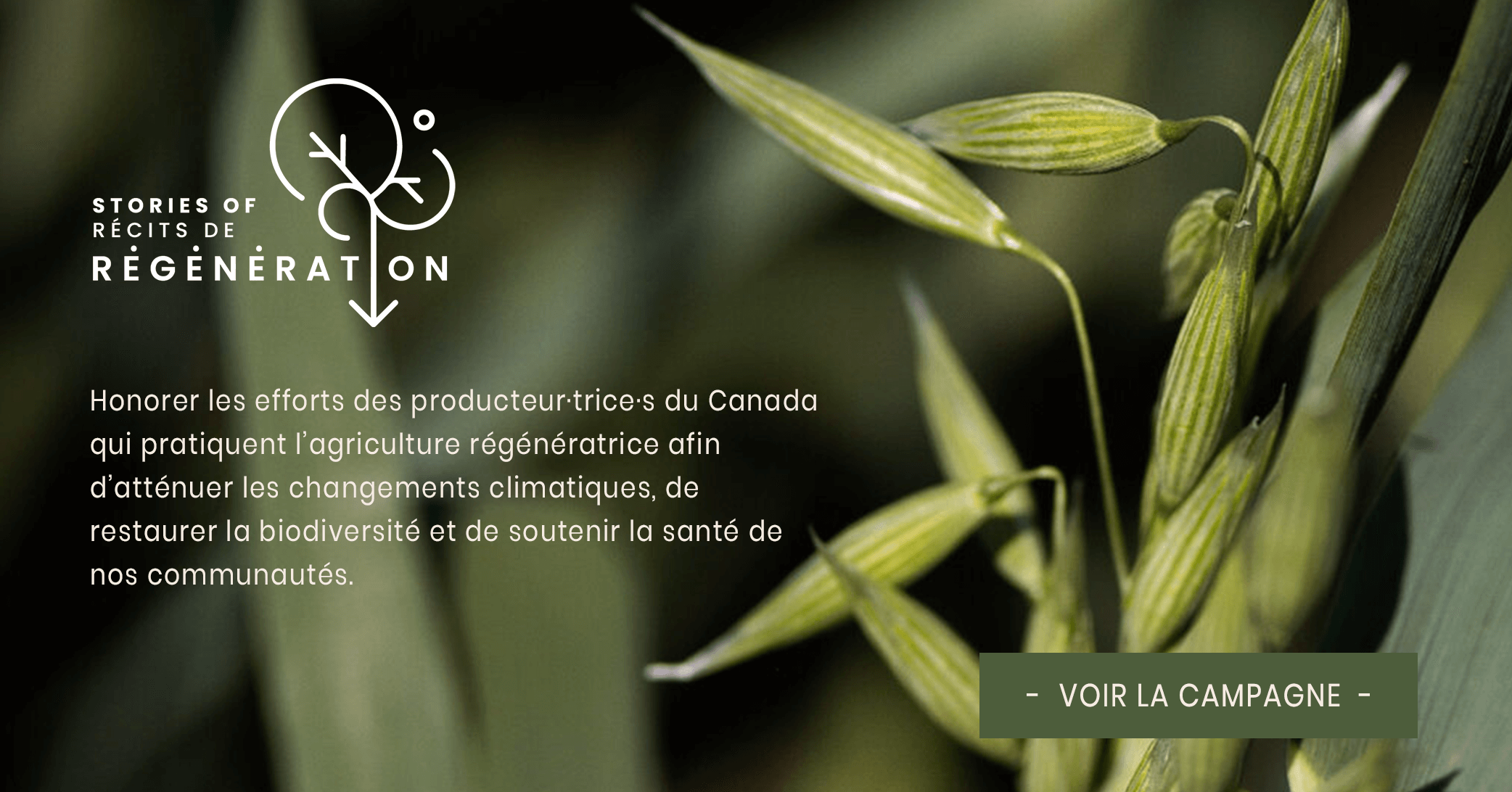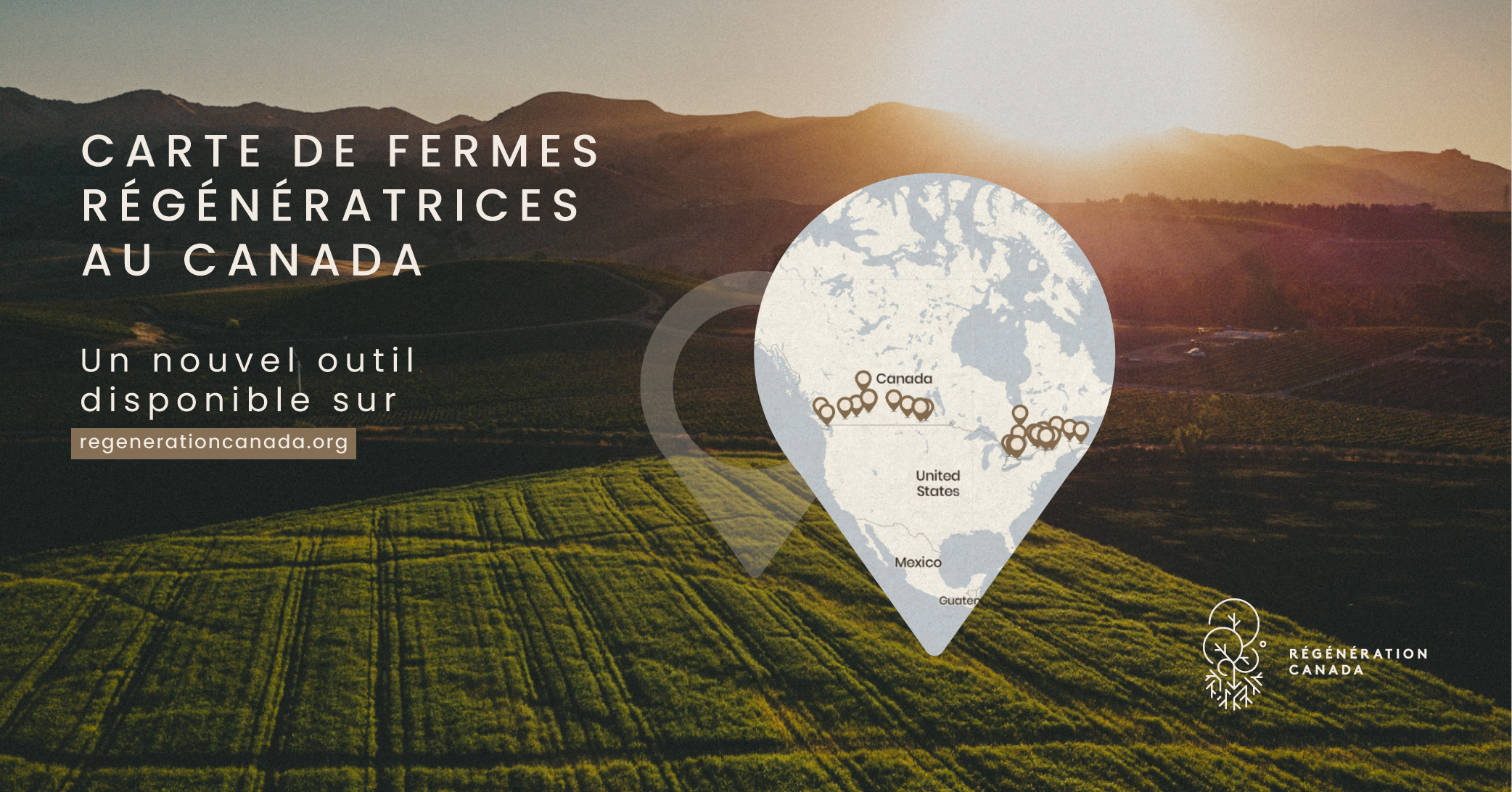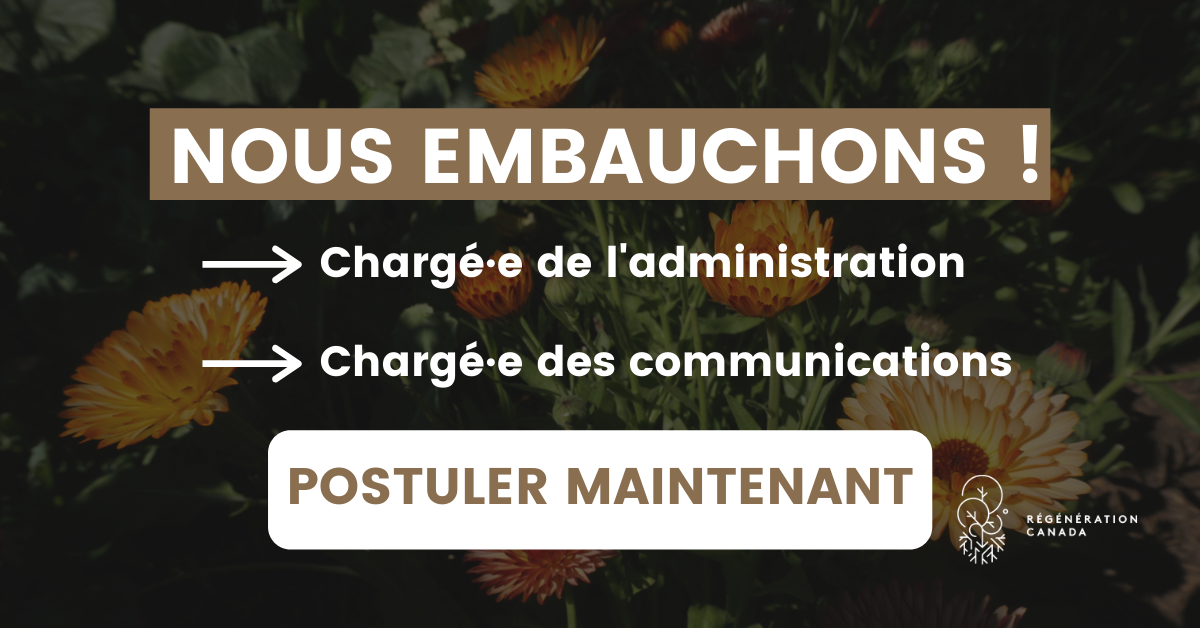[Events in English – Événements en anglais]
Launching in 2022, Regeneration Canada and Oatly are teaming up on an exciting project highlighting a portion of the vast network of Canadian land managers whose knowledge and experience have allowed them to succeed in implementing regenerative farming systems.
“Discovering the Possibilities” is an 8-stop demonstration tour showcasing several leading innovative farmers championing soil health across the Canadian Prairies, proving Canada’s potential to further regenerate cropland while producing quality goods.
8 FIELD DAYS AND FARM VISITS:
MANITOBA
|
CANCELLED Tuesday, July 12 |
THIS EVENT IS CANCELLED. Alex Boersch and his father, Andreas, farm 5,000 acres of both regenerative and certified organic land on heavy clay soils near Elie, MB. The farm produces wheat, oats, barley, flax, canola, soybeans, corn, and peas. Strategies to improve soil health have included intercropping, cover cropping, compost applications, and reduced fertilizer inputs using C-based stabilizers. The family has been experimenting with no-till methods on their conventional land and will soon be taking their first steps into livestock integration with fall grazing of sheep on crop residues and cover crops. |
|
|
|
|
CANCELLED Wednesday, July 13 |
THIS EVENT IS CANCELLED. South Glanton Farms is owned and operated by Ryan and Sarah Boyd, together with their children and Ryan’s parents, in Forrest, Manitoba. The farm consists of approximately 300 beef cows, calving in June, and a diverse crop rotation including spring and winter wheat, oats, canola, flax, peas, soybeans, corn, perennial forages, and diverse annual forages for grazing and greenfeed. Several different management practices have been used to enhance soil health, including adaptive grazing, high stock density grazing, no-till, a diverse crop rotation, intercropping, winter grazing corn, bale grazing, and stockpile grazing. Ryan is the author of “Grazing Ruminants: A Long-term Solution to Agriculture Profitability, Productivity and Climate Change,” published in February 2021 by Nuffield Canada. Since 2003, Ryan has been leading the conversation in Manitoba, Canada as well as internationally about ways to make farms more resilient to weather and market extremes and to deliver a better quality of life. |
|
|
|
|
Thursday, July 14: 10am-3pm Cardale Grain Corp visit and field day in Minnedosa. |
Chris Raupers owns and operates Cardale Grain Corp near Minnedosa, MB with his wife Lindsey. On 6,500 acres, they produce wheat, barley, oats, canola, and pea/oat & wheat/faba intercrops. In collaboration with a neighbour, cattle are also integrated to graze on full-season cover crops. Chris has been transitioning his farm towards reducing inputs using sap analysis, targeted foliar applications, and C-based stabilizers with fertilizer inputs. The family has recently begun direct marketing a line of regeneratively-grown red fife, hard red, and whole wheat flours. |
| SASKATCHEWAN |
|
|
Friday, July 15: 10am-3pm Rosengren Farms visit and field day in Midale. |
Colin and Leigh Rosengren are the owner-operators of Rosengren Farms, an 8,000-acre mixed cattle and grain farm near Midale, SK. Colin is a pioneer of many sustainable agricultural production practices such as no-till and has been at the leading edge of research and implementation intercropping since 2004. The farm uses variable rate technology for both fertilizer inputs and intercrop seeding rates. Colin is also one of the founding members of Three Farmers, a small group of Saskatchewan farmers passionate about growing natural healthy food and dedicated to providing that personal connection between consumers and producers. Three Farmers pioneered the introduction of camelina oil into the Canadian marketplace and have since added roasted chickpea, pea, faba bean, and lentil snacks to their product range. |
|
|
|
|
Saturday, July 16: 12pm-6pm Richards Family Farm visit and field day in Bangor. |
Richards Family Farm is owned and operated by Garry and Lynn Richards in Bangor, Saskatchewan, who began implementing an approach of holistic management on their farm in 2003. They started investing in the land by seeding diverse blends of grass and legume species for pasture, mimicking nature by calving on pasture in May, and imitating how the bison once grazed by building the necessary infrastructure to intensively graze cattle on a small area of land for short periods of time. For cattle genetics that would finish well on grass, they crossbred with Black Angus to develop a herd that would achieve all the farm’s goals. Richards Family Farm has been involved in many studies, projects and trials that have demonstrated the improved water holding capacity of the land, increased biodiversity, increased organic matter, and increased carbon sequestration. |
| ALBERTA | |
|
Monday, July 25: 10am-3pm Taylor Snyder Farm visit and field day in Glendon. |
Taylor Snyder produces peas, canola, wheat, oats, barley, and hay/alfalfa with his father and brother near Glendon, AB. On their 1,300 acres, they also have integrated livestock with 90 beef cows, 70 hogs, and up to 100 chickens. Taylor’s journey into regenerative agriculture began after a few difficult seasons whereby out of necessity he had to produce crops with low or no inputs. Since 2015, there has been zero synthetic nitrogen applied to the soil and Taylor is finding fewer problems with weeds and pests. This season, the farm is heavily embracing intercropping practices with wheat/flax, peas/canola, barley/pea, oat/peas, and peas/oats/flax. |
|
|
|
|
Tuesday, July 26: 10am-3pm Long Family Farm visit and field day in Barrhead. |
Byron and Megan Long manage 1,500 acres of grain-livestock integrated land near Barrhead, AB. Crops include wheat, barley, oats, forage peas, yellow peas, faba beans, canola, flax, and mustard. 60 cow/calf pairs are fed on rotationally grazed native pasture composed of a high diversity of annual crops and alfalfa/grass hay. Due to frustrations with his previous high-input, high-risk farming system, Byron has been transitioning the farm toward a lower input model with steady decreases in fertilizer inputs and integration of a range of intercrops (pea/oats, pea/canola, oat/flax, canola/oats). Additionally, he is actively using more cropland for winter feed by chaff bunch grazing and hauling chaff off unfenced cropping ground to help reduce winter feed costs and reduce weed seed load for the following season. |
|
|
|
|
Wednesday, July 27: 10am-3pm Lamb Farms visit and field day in Stavely. |
Josh Fankhauser is the agronomy manager and 5th generation farmer on Lamb Farms, a multi-generational operation that has been farming near Claresholm, AB since 1904. On their 10,000 acres, the farm produces grain (cereals, canola, flax, peas), perennial forage, and permanent pasture on a mixture of dry and irrigated land. Josh has integrated intercrops (pea/canola), undersown companions (annual ryegrass and clovers), and various blends on their grainlands. The farm is also livestock integrated with 550 cow/calf pairs. |
Organizers and Guest Speakers:
Oatly
Launched in North America in 2016, Oatly is the world’s original and largest oat milk company. For over 25 years, the company has exclusively focused on developing expertise around oats: a power crop with inherent properties suited for sustainability and human health. Headquartered in Malmö, Sweden, the Oatly brand is available in more than 20 countries globally. The company sources 100% of its oats, and almost all of its non-GMO canola oil, for products sold in North America from central and western Canada. Within the next 8 years, the company hopes to prove to its customers that, in addition to offering nutritional benefits, Oatly products are actively increasing ecosystem health, improving farmer livelihoods, and contributing to climate solutions.
RC
Regeneration Canada is a nonprofit organization dedicated to promoting soil regeneration in order to mitigate climate change, restore biodiversity, improve water cycles, and support a healthy food system.
We strive towards this goal by creating spaces for farmers, landowners, scientists, agronomists, businesses, community organizations, governments, and citizens to learn, connect and take action to regenerate soils.
Joel Williams
Joel Williams is an independent plant and soil health educator, a healthy soils advocate, and a presenter on soil biology, plant nutrition, and agroecological farming systems. Joel has a Bachelor of Agricultural Science and an MSc in Food Policy and he has a passion for teaching and sharing both scientific and practical information. He has worked throughout Australia, the UK, and Canada, and he consults with farmers around the world, implementing strategies to optimize fertilizer inputs and improve soil health within agroecosystems.
In collaboration with Regeneration Canada, Joel recently presented a short course focusing on reducing dependency on fertilizer inputs using Integrated Nutrient Management principles. Joel will be expanding on the practical application of these principles through the case study of the host farm and will support the farm tour with commentary alongside our host farmers. Joel will also facilitate a discussion-based question-and-answer workshop so be sure you bring along your questions!
Cost:
$35 + fees.
Discount for members of Regeneration Canada.
To become a member and benefit from free webinars and more, join our network here.




